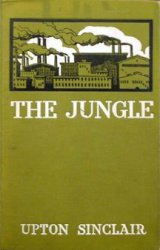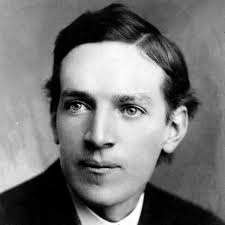The Jungle Page #8
The Jungle is a 1906 novel by the American journalist and novelist Upton Sinclair. Sinclair wrote the novel to portray the harsh conditions and exploited lives of immigrants in the United States in Chicago and similar industrialized cities.
It was nearly a year and a half ago that Jurgis had met Ona, at a horse fair a hundred miles from home. Jurgis had never expected to get married--he had laughed at it as a foolish trap for a man to walk into; but here, without ever having spoken a word to her, with no more than the exchange of half a dozen smiles, he found himself, purple in the face with embarrassment and terror, asking her parents to sell her to him for his wife--and offering his father's two horses he had been sent to the fair to sell. But Ona's father proved as a rock--the girl was yet a child, and he was a rich man, and his daughter was not to be had in that way. So Jurgis went home with a heavy heart, and that spring and summer toiled and tried hard to forget. In the fall, after the harvest was over, he saw that it would not do, and tramped the full fortnight's journey that lay between him and Ona. He found an unexpected state of affairs--for the girl's father had died, and his estate was tied up with creditors; Jurgis' heart leaped as he realized that now the prize was within his reach. There was Elzbieta Lukoszaite, Teta, or Aunt, as they called her, Ona's stepmother, and there were her six children, of all ages. There was also her brother Jonas, a dried-up little man who had worked upon the farm. They were people of great consequence, as it seemed to Jurgis, fresh out of the woods; Ona knew how to read, and knew many other things that he did not know, and now the farm had been sold, and the whole family was adrift--all they owned in the world being about seven hundred rubles which is half as many dollars. They would have had three times that, but it had gone to court, and the judge had decided against them, and it had cost the balance to get him to change his decision. Ona might have married and left them, but she would not, for she loved Teta Elzbieta. It was Jonas who suggested that they all go to America, where a friend of his had gotten rich. He would work, for his part, and the women would work, and some of the children, doubtless--they would live somehow. Jurgis, too, had heard of America. That was a country where, they said, a man might earn three rubles a day; and Jurgis figured what three rubles a day would mean, with prices as they were where he lived, and decided forthwith that he would go to America and marry, and be a rich man in the bargain. In that country, rich or poor, a man was free, it was said; he did not have to go into the army, he did not have to pay out his money to rascally officials--he might do as he pleased, and count himself as good as any other man. So America was a place of which lovers and young people dreamed. If one could only manage to get the price of a passage, he could count his troubles at an end. It was arranged that they should leave the following spring, and meantime Jurgis sold himself to a contractor for a certain time, and tramped nearly four hundred miles from home with a gang of men to work upon a railroad in Smolensk. This was a fearful experience, with filth and bad food and cruelty and overwork; but Jurgis stood it and came out in fine trim, and with eighty rubles sewed up in his coat. He did not drink or fight, because he was thinking all the time of Ona; and for the rest, he was a quiet, steady man, who did what he was told to, did not lose his temper often, and when he did lose it made the offender anxious that he should not lose it again. When they paid him off he dodged the company gamblers and dramshops, and so they tried to kill him; but he escaped, and tramped it home, working at odd jobs, and sleeping always with one eye open. So in the summer time they had all set out for America. At the last moment there joined them Marija Berczynskas, who was a cousin of Ona's. Marija was an orphan, and had worked since childhood for a rich farmer of Vilna, who beat her regularly. It was only at the age of twenty that it had occurred to Marija to try her strength, when she had risen up and nearly murdered the man, and then come away. There were twelve in all in the party, five adults and six children--and Ona, who was a little of both. They had a hard time on the passage; there was an agent who helped them, but he proved a scoundrel, and got them into a trap with some officials, and cost them a good deal of their precious money, which they clung to with such horrible fear. This happened to them again in New York--for, of course, they knew nothing about the country, and had no one to tell them, and it was easy for a man in a blue uniform to lead them away, and to take them to a hotel and keep them there, and make them pay enormous charges to get away. The law says that the rate card shall be on the door of a hotel, but it does not say that it shall be in Lithuanian. It was in the stockyards that Jonas' friend had gotten rich, and so to Chicago the party was bound. They knew that one word, Chicago and that was all they needed to know, at least, until they reached the city. Then, tumbled out of the cars without ceremony, they were no better off than before; they stood staring down the vista of Dearborn Street, with its big black buildings towering in the distance, unable to realize that they had arrived, and why, when they said “Chicago,” people no longer pointed in some direction, but instead looked perplexed, or laughed, or went on without paying any attention. They were pitiable in their helplessness; above all things they stood in deadly terror of any sort of person in official uniform, and so whenever they saw a policeman they would cross the street and hurry by. For the whole of the first day they wandered about in the midst of deafening confusion, utterly lost; and it was only at night that, cowering in the doorway of a house, they were finally discovered and taken by a policeman to the station. In the morning an interpreter was found, and they were taken and put upon a car, and taught a new word--“stockyards.” Their delight at discovering that they were to get out of this adventure without losing another share of their possessions it would not be possible to describe. They sat and stared out of the window. They were on a street which seemed to run on forever, mile after mile--thirty-four of them, if they had known it--and each side of it one uninterrupted row of wretched little two-story frame buildings. Down every side street they could see, it was the same--never a hill and never a hollow, but always the same endless vista of ugly and dirty little wooden buildings. Here and there would be a bridge crossing a filthy creek, with hard-baked mud shores and dingy sheds and docks along it; here and there would be a railroad crossing, with a tangle of switches, and locomotives puffing, and rattling freight cars filing by; here and there would be a great factory, a dingy building with innumerable windows in it, and immense volumes of smoke pouring from the chimneys, darkening the air above and making filthy the earth beneath. But after each of these interruptions, the desolate procession would begin again--the procession of dreary little buildings.
Translation
Translate and read this book in other languages:
Select another language:
- - Select -
- 简体中文 (Chinese - Simplified)
- 繁體中文 (Chinese - Traditional)
- Español (Spanish)
- Esperanto (Esperanto)
- 日本語 (Japanese)
- Português (Portuguese)
- Deutsch (German)
- العربية (Arabic)
- Français (French)
- Русский (Russian)
- ಕನ್ನಡ (Kannada)
- 한국어 (Korean)
- עברית (Hebrew)
- Gaeilge (Irish)
- Українська (Ukrainian)
- اردو (Urdu)
- Magyar (Hungarian)
- मानक हिन्दी (Hindi)
- Indonesia (Indonesian)
- Italiano (Italian)
- தமிழ் (Tamil)
- Türkçe (Turkish)
- తెలుగు (Telugu)
- ภาษาไทย (Thai)
- Tiếng Việt (Vietnamese)
- Čeština (Czech)
- Polski (Polish)
- Bahasa Indonesia (Indonesian)
- Românește (Romanian)
- Nederlands (Dutch)
- Ελληνικά (Greek)
- Latinum (Latin)
- Svenska (Swedish)
- Dansk (Danish)
- Suomi (Finnish)
- فارسی (Persian)
- ייִדיש (Yiddish)
- հայերեն (Armenian)
- Norsk (Norwegian)
- English (English)
Citation
Use the citation below to add this book to your bibliography:
Style:MLAChicagoAPA
"The Jungle Books." Literature.com. STANDS4 LLC, 2025. Web. 9 Jan. 2025. <https://www.literature.com/book/the_jungle_272>.




Discuss this The Jungle book with the community:
Report Comment
We're doing our best to make sure our content is useful, accurate and safe.
If by any chance you spot an inappropriate comment while navigating through our website please use this form to let us know, and we'll take care of it shortly.
Attachment
You need to be logged in to favorite.
Log In